|
|
|
Sort Order |
|
|
|
Items / Page
|
|
|
|
|
|
|
| Srl | Item |
| 1 |
ID:
131332
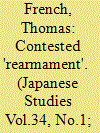

|
|
|
|
|
| Publication |
2014.
|
| Summary/Abstract |
This paper employs previously unused archival sources to highlight some of the misconceptions and debates which surround the Japanese National Police Reserve (1950-1952), the precursor to today's Ground Self Defense Force. The paper, which is the first on the National Police Reserve in English, examines much of the current historiography's categorisation of the Reserve as an army, based on a very thin set of sources, and contrasts this with the content of the primary sources in an attempt to reveal the true character of the force. In doing so it also attempts to assess the relative importance of the internal and external influences behind the NPR's creation. The article and its conclusions will be valuable in deepening the understanding of the character of the NPR and its position in the broader histories of the Occupation of Japan, Japanese security policy and Japan's Cold War(s).
|
|
|
|
|
|
|
|
|
|
|
|
|
|
|
|
| 2 |
ID:
131333
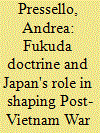

|
|
|
|
|
| Publication |
2014.
|
| Summary/Abstract |
Japan's postwar contribution to international political affairs is often described as limited, primarily due to Japan's focus on reconstructing and expanding its economy. However, this article argues that since the 1970s, Japan has played an active role in shaping the post-Vietnam War order in Southeast Asia. The Japanese actively sought to address the regional power vacuum that had been left by the diminished American presence and the Sino-Soviet attempts to fill it. To do so, in 1977, Japanese Prime Minister Fukuda Takeo announced a foreign policy initiative, the so-called Fukuda Doctrine. One of its pillars was Japan's commitment to promoting coexistence and cooperation among ASEAN nations and their communist Indochinese neighbors. Based on declassified documents and other primary sources, this study demonstrates the strategic nature of the Fukuda Doctrine and sheds light on its political, geopolitical, and security objectives. This includes the realization of a Southeast Asian order in which Japan could maintain a position of influence and, through it, enhance its international political role. The strategic implications of this approach explain why Japan continued to pursue the doctrine despite increased regional and global tension following the 1979 outbreak of the Cambodian conflict and renewed Cold War tensions in the early 1980s.
|
|
|
|
|
|
|
|
|
|
|
|
|
|
|
|
| 3 |
ID:
131335
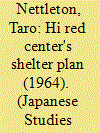

|
|
|
|
|
| Publication |
2014.
|
| Summary/Abstract |
This essay considers the relationship between the Japanese Fluxus-affiliated collective Hi Red Center's performance event Shelter Plan (1964) and Frank Lloyd Wright's Imperial Hotel, in which the event was staged. In the year of the Tokyo Olympics and the heralding of the end of the post-war era for Japan, Shelter Plan, which involved the production of tailor-made bomb shelters, rejected the ideological function of the Tokyo Olympics, and the increasingly repressive political climate that accompanied it. I argue that Shelter Plan needs to be understood as a site-specific response to one of Frank Lloyd Wright's major works. As successor to a lineage of hotels designed to house Western visitors in Japan, and imagined by Wright as an opportunity to bring the Japanese 'off their knees' and into modernity, the Imperial Hotel was a highly charged site for addressing the politics of intercultural exchange between Japan and the West.
|
|
|
|
|
|
|
|
|
|
|
|
|
|
|
|
| 4 |
ID:
131331
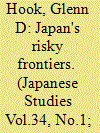

|
|
|
|
|
| Publication |
2014.
|
| Summary/Abstract |
This article investigates Japan's current role in the Senkaku Islands. The government maintains administrative control of these tiny, uninhabited islands and rocks at the frontier of Japan, but both the governments of China and Taiwan dispute Japanese claims to sovereignty and claim sovereignty over the islands themselves. Whilst much of the extant literature examines these competing claims, this article instead explores the relationship between risk, sovereignty and governance at the frontiers of Japan. It seeks to demonstrate in particular how the governance of Japan's maritime frontiers reflects a broader process of the recalibration of risk by the Abe Shinz? government as part of ending the postwar regime. Its main purpose is twofold: first, to illuminate how the government carries out administrative control and governance of a remote, uninhabited territory when sovereignty is challenged and in dispute; and second, to elucidate how the government's recalibration of risk generates a range of costs for the Japanese market and society as a result of the deterioration of relations with China arising from the way risk is being recalibrated.
|
|
|
|
|
|
|
|
|
|
|
|
|
|
|
|
| 5 |
ID:
131334
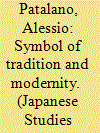

|
|
|
|
|
| Publication |
2014.
|
| Summary/Abstract |
In the literature on the Japanese postwar rearmament, the loss of credibility of the Imperial armed forces prompted the Japan Self-Defence Forces to distance themselves from that institutional lineage and to define and display their own image. Underpinning this was the notion that the Imperial Army and Navy were publicly regarded as organisations that could no longer offer relevant professional models. This article reviews that assumption, investigating the early postwar naval narrative as it became popularised by journalist and historian It? Masanori. It suggests that the postwar rejection of the imperial military past did not affect the Imperial Army and Navy equally. The reputation of the Imperial Navy as a professional organisation was not eradicated from postwar public memory. A distinguished correspondent and an internationally renowned writer, It? dedicated his work to shape the early postwar naval narrative, defining the virtues that made the navy a symbol of the nation's own journey into modernity. In so doing, he joined the public debate on rearmament and argued for the standards of the Imperial Navy to find their way into the professional ethos of the new armed forces
|
|
|
|
|
|
|
|
|
|
|
|
|
|
|
|
|
|
|
|
|